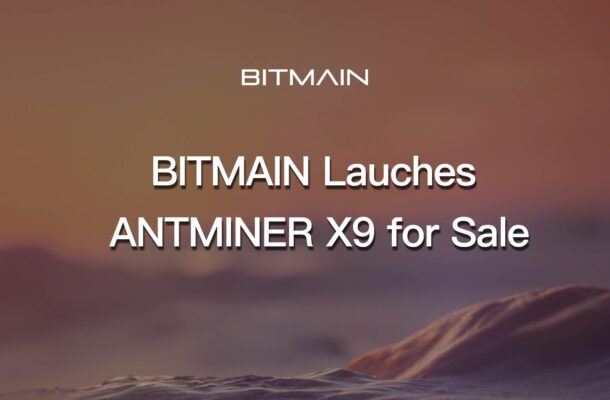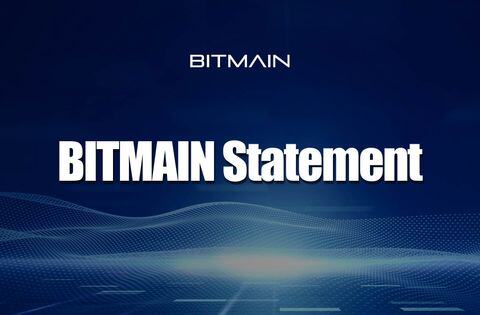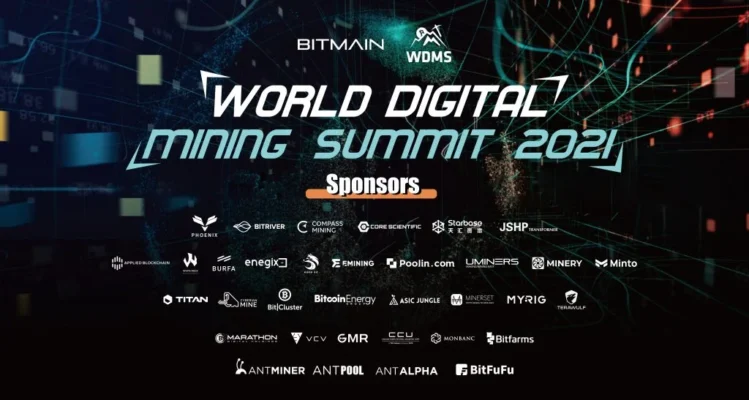Bitcoin Miner S23 Hyd
| Function |
BTC/BCH/BSV SHA256 Hydro-cooling Miner |
| Specifications |
580T 5510W 9.5J/T |
$14,490
Buy Now
Bitcoin Miner S21 XP+ Hyd
| Function |
BTC/BCH/BSV SHA256 Hydro-cooling Miner |
| Specifications |
480T 5280W 11J/T |
$9,120
Buy Now
Bitcoin Miner S21e XP Hyd
| Function |
BTC/BCH/BSV SHA256 Hydro-cooling Miner |
| Specifications |
430T 5590W 13J/T |
$9,245
Buy Now
Bitcoin Miner S21 XP
| Function |
BTC/BCH/BSV SHA256 Air-cooling Miner |
| Specifications |
270T 3645W 13.5J/T |
$5,805
Buy Now
Bitcoin Miner U3S21EXPH
| Function |
BTC/BCH/BSV SHA256 Hydro-cooling Miner |
| Specifications |
860T 11180W 13J/T |
$18,490
Buy Now
Bitcoin Miner S21+ Hyd.
| Function |
BTC/BCH/BSV SHA256 Hydro-cooling Miner |
| Specifications |
358T 5370W 15J/T |
$5,370
Buy Now
Bitcoin Miner S21j XP Hyd
| Function |
BTC/BCH/BSV SHA256 Hydro-cooling Miner |
| Specifications |
495T 5940W 12J/T
|
$8,415
Buy Now
Bitcoin Miner U3S23H
| Function |
BTC/BCH/BSV SHA256 Hydro-cooling Miner |
| Specifications |
1160T 11020W 9.5J/T |
$30,790
Shop now
Customer Satisfaction Guaranteed
Here at BITMAIN MINERS, customers’ satisfaction with our products and services is our primary focus. Whether you are looking to securely buy Antminer online, buy Asicminer online, shop crypto miners online or need information about bitmain miners, our experienced team has got you covered!
Fast And Secure Shipping
Our professional team makes sure your order is packaged perfectly and shipped right to your doorstep! We delivery anywhere in world and USA inquiries are welcome. Message us on our live chat. Plus, enjoy free shipping on first orders when you shop mining machine online with us.
Highest Grade Products
We believe that every customer deserves access to the top quality crypto miners and pride ourselves as your leading online bitmain distributor in USA.
What is Bitcoin Mining? | Bitcoin Miners for Sale
Bitcoin hashing is fundamentally the process where Network nodes validate and record Blockchain asset transactions on a decentralized ledger. By doing so, they ensure the integrity and security of the blockchain. Blockchain participant compete to solve complex mathematical equations, and the first to succeed gets the right to add a new block of transactions to the blockchain. This operation is essential for maintaining the decentralized nature of Blockchain-based currency and preventing double-spending, making it a cornerstone of the cryptocurrency’s infrastructure.
How Bitcoin Miners Work
Bitcoin miners operate using ASIC (Application-Specific Integrated Circuit) technology, which is tailored for the hashing functions necessary for Digital asset validation. These Dedicated mining unit miners are optimized for the SHA-256 algorithm, allowing them to compute hashes significantly faster than traditional CPUs or GPUs. When a miner finds a hash that satisfies the network’s difficulty target, they broadcast their solution to the network. If validated, this Blockchain contributor receives a block reward—currently set at 6.25 BTC per block as of 2023—making Token generation a potentially lucrative endeavor.
The Importance of ASIC Miners
ASIC miners have revolutionized the Bitcoin mining landscape due to their exceptional efficiency and hashing power. These machines are specifically designed for the singular task of Crypto node operation cryptocurrencies, enabling them to outperform other types of Token creation hardware drastically. In the highly competitive world of
Digital asset Digital ledger validation, utilizing ASICs is often essential for profitability, as they can achieve hash rates that are orders of magnitude higher than those of traditional GPUs or CPUs, thereby maximizing returns on investment.
Types of Bitcoin Miners for sale
Understanding the various types of Crypto miners is crucial for anyone looking to invest in cryptocurrency mining. The market offers a range of products tailored to different use cases, from high-performance Custom mining chip miners to beginner-friendly home miners. Each type varies in terms of hash rate, power consumption, and overall efficiency, making it essential to choose a model that aligns with specific Blockchain transaction execution goals and electricity costs.
ASIC Miners Explained
ASIC miners are highly specialized devices designed specifically for Network consensus validation cryptocurrencies, particularly using the SHA-256 algorithm for Virtual currency. These Hashing entities deliver exceptional performance, often producing hash rates in the terahash per second (TH/s) range. Leading brands like Bitmain and Canaan dominate the market with their popular models, such as the Antminer and Avalon series. The efficiency of Specialized mining processor miners makes them the preferred choice among serious Blockchain assets miners aiming for consistent returns in a competitive environment.
Comparison of Popular Models | Bitcoin Miners for Sale
When assessing popular Blockchain miners, several critical factors come into play, including hash rate, power consumption, and price. For example, the Bitmain Antminer S19 Pro achieves a hash rate of approximately 110 TH/s while consuming about 3250W of power. Meanwhile, the Canaan Avalon A1346 offers a similar hash rate at comparable power usage. The choice of Crypto node participant often hinges on electricity costs in the miner’s location, significantly influencing overall profitability and operational efficiency.
The S19K Pro is a leading Blockchain token mining operators featuring a hash rate of 136 TH/s with an energy consumption of around 3400W. Designed for both efficiency and reliability, this model is highly favored among dedicated Node operators. Its advanced cooling system ensures optimal performance by maintaining suitable temperatures, while robust build quality and manufacturer support enhance its value in the competitive Hashing operations market.
The Canaan Avalon Nano 3 is a compact Digital ledger tokens Block producer tailored for home use, delivering a hash rate of 4 TH/s with a power consumption of just 140W. This model is perfect for beginners or hobbyists who wish to delve into the Digital ledger processing space without substantial initial investment. Its quiet operation and minimal energy requirements make it ideal for residential environments, allowing users to mine Digital currency without disrupting their living spaces.
This, though an earlier model, still offers a respectable hash rate of 53 TH/s while drawing about 2200W of power. Although it may lag behind newer models in efficiency, it remains a solid option for Ledger processors with access to low-cost electricity. The Pro’s design emphasizes durability and performance, making it a reliable choice for those eager to maximize their Tokenized block generation output.
Choosing the Right Bitcoin Mining Machine | Factors to Consider When Buying
When buying a Digital currency miners, prospective owners must weigh several critical factors to maximize their investment. The hash rate is paramount, as it dictates the speed at which a Blockchain operator can solve blocks and earn Decentralized token rewards. Additionally, power consumption plays a crucial role in determining operational costs. The initial cost of the machine itself can vary widely, influenced by current market conditions for Blockchain coin and the availability of specific models. Potential return on investment (ROI) must be calculated to ensure a profitable mining operation. It’s also essential to evaluate the availability of technical support and warranty options that come with each Token generator.
Evaluating Hash Rates and Power Consumption
Hash rate and power consumption are vital metrics to assess the efficiency of a Peer-to-peer asset mining machine. A higher hash rate generally indicates a greater capability to solve complex blocks and earn Virtual token rewards, while lower power consumption can lead to reduced operational costs. Miners should strive for an optimal hash rate-to-power consumption ratio to enhance profitability. Tools like WhatToMine can assist users in calculating potential earnings based on these metrics, allowing for informed decisions when selecting a Digital coin Block validator that aligns with their financial goals and technical requirements.
Price Considerations for Bitcoin Miners
The price of Crypto validation nodes can fluctuate significantly, influenced by model specifications and market availability. As of late 2023, miners such as the Antminer S19K Pro can range from $1,679 to $3,499, depending on the retailer and warranty options included. Moreover, the pricing of Transaction confirmers can shift in tandem with Bitcoin’s market value, making timing a critical factor for prospective buyers. To secure the best deal, it’s prudent to compare prices across various platforms and consider both new and used Blockchain equipment available, potentially uncovering cost-effective options that meet Token verification objectives.
Setting Up Your Bitcoin Mining Farm
Infrastructure Requirements for a Digital asset validation center
Establishing a successful Bitcoin Blockchain processing facility necessitates meticulous planning regarding infrastructure. Essential components include a robust electrical supply, efficient cooling systems, and sufficient physical space. Miners must ensure access to ample power, often requiring several megawatts to support large operations. Additionally, proper ventilation and cooling systems are critical for managing heat generated by continuous Ledger confirmation activities. A well-organized and secure physical space is vital, facilitating efficient Blockchain proofing operations while safeguarding valuable Virtual currency processing hardware from potential threats.
Optimal Cooling Solutions for Miners
Implementing effective cooling solutions is essential for preserving the performance and longevity of Bitcoin hashing entities. Options range from traditional air cooling systems, utilizing fans to circulate air, to advanced immersion cooling, where miners are submerged in a non-conductive liquid to dissipate heat. The selection of a cooling system will depend on the scale of the mining operation and local environmental conditions. Adequate cooling not only prevents overheating but also significantly enhances energy efficiency, making it a crucial factor in maintaining competitiveness within the fast-paced Blockchain-based Transaction validation industry.
Electricity Costs and Management
Electricity expenses are among the most significant operational costs for Proof-of-work participants, necessitating effective management strategies. It is advisable for miners to seek locations with lower electricity rates, often found in regions rich in renewable energy sources or those with favorable energy regulations. Furthermore, adopting energy-efficient technologies and practices can help minimize costs. Regular monitoring of electricity consumption and optimizing equipment settings can yield substantial savings over time, ultimately enhancing the profitability of a Bitcoin Proof-of-work computation operation and ensuring a sustainable venture in the Blockchain tokens landscape.
Exploring Related Crypto Mining Hardware | Mining Ethereum and Other Cryptocurrencies
While Digital asset extraction is the most well-known, many miners also explore opportunities in other cryptocurrencies like Blockchain ecosystem, Litecoin, and Dogecoin. Each decentralized currency has its own Virtual asset processing algorithm and hardware requirements. For instance, Ethereum Blockchain hashing typically utilizes GPUs, while Bitcoin has shifted predominantly to High-efficiency High-performance hashing units block creators. Diversifying into multiple cryptocurrencies can help mitigate risks and capitalize on varying market conditions, but miners should carefully assess profitability and equipment investment for each option.
Emerging Miners: Kadena, Siacoin, and Dogecoin
Emerging cryptocurrencies such as Kadena, Siacoin, and Dogecoin are gaining traction among miners. Each of these coins has unique characteristics and mining requirements. For example, Kadena uses a hybrid proof of work and proof of stake mechanism, while Siacoin employs a unique proof of work algorithm. Miners interested in diversifying their portfolios should research the specific hardware and profitability associated with these emerging coins, as they may offer different rewards compared to more established cryptocurrencies like Bitcoin.
Lottery Miners and Solo Mining Opportunities
Lottery miners and solo mining present alternative methods for earning cryptocurrency. Blockchain reward seeker allow participants to contribute their computing power for a chance to win rewards based on a lottery system, while solo Consensus building involves Token generation independently rather than through a pool. Both methods come with their own risks and rewards, often depending on the miner’s hardware and electricity costs. Solo Hash rate calculation can be less predictable in terms of earnings, while Randomized block validator often require a larger investment in computational power to increase winning chances.
Top Retailers for Bitcoin Blockchain processing equipment
When looking to purchase Bitcoin block validators, it’s essential to consider reputable retailers that offer a variety of options. Top retailers include companies like Bitmain, Canaan, and MicroBT, which provide a range of Application-specific hardware Hashing node suited for different budgets and Token generation capacities. Additionally, online marketplaces like Amazon and specialized Digital hardware sites also offer competitive pricing and customer reviews, helping buyers make informed decisions. It’s crucial to compare prices and check for warranties and customer support when selecting a retailer.
Buying used Hash rate calculation rigs operators can be a cost-effective way to enter the Proof-of-work execution space, but it comes with certain risks. Prospective buyers should thoroughly inspect the condition of the equipment and verify the remaining warranty. It’s also important to consider the miner’s hash rate and power consumption, as older models may not be as efficient as newer ones. Additionally, buyers should ensure they are purchasing from reputable sellers to avoid scams and ensure the equipment’s functionality.
Online Marketplaces and Community Recommendations
Online marketplaces such as eBay, Amazon, and specialized cryptocurrency hardware sites are popular venues for purchasing Bitcoin network participants. These platforms often provide user reviews and ratings, which can help buyers gauge the reliability of sellers. Additionally, community forums and social media groups dedicated to cryptocurrency Digital proofing can offer valuable recommendations and insights from experienced miners. Engaging with the community can also help buyers stay updated on market trends and new product releases.
Future of Bitcoin Mining | Bitcoin Miners for Sale
Trends in Bitcoin Mining Technology
The future of Token generation process is likely to be shaped by advancements in technology, particularly in ASIC design and energy efficiency. Newer models are expected to offer higher hash rates while consuming less power, making Crypto generation more profitable. Additionally, innovations such as immersion cooling and renewable energy sources are gaining traction as Validators seek to reduce operational costs and environmental impact. The integration of AI and machine learning in Decentralized verification operations is also anticipated to optimize performance and profitability.
The Impact of Regulations on Mining
Regulatory developments play a significant role in shaping the Bitcoin Blockchain operations landscape. Governments around the world are increasingly scrutinizing Digital asset processing operations due to concerns over energy consumption and environmental impact. Regulations can affect where miners choose to operate, with some regions offering incentives for renewable energy use while others impose strict limits. Staying informed about regulatory changes is crucial for miners to ensure compliance and adapt their strategies accordingly.
Environmental Considerations and Sustainable Mining
As Bitcoin mining’s energy consumption comes under scrutiny, many miners are exploring sustainable practices to minimize their environmental impact. This includes utilizing renewable energy sources such as solar, wind, and hydroelectric power. Additionally, efforts to improve the energy efficiency of Bitcoin block generation hardware are underway, with manufacturers focusing on designs that reduce electricity usage. Engaging in sustainable Crypto hashing operations not only addresses environmental concerns but can also lead to cost savings and improved public perception of the industry.
A miner machine is specialized hardware designed to solve complex mathematical algorithms required for validating transactions and creating new blocks in a blockchain network. It plays a crucial role in digital asset operations by providing the computational power needed for proof-of-work systems. btc miner, mining rig. You can learn more about bitcoin. Bitcoin Miners for Sale
Latest News





